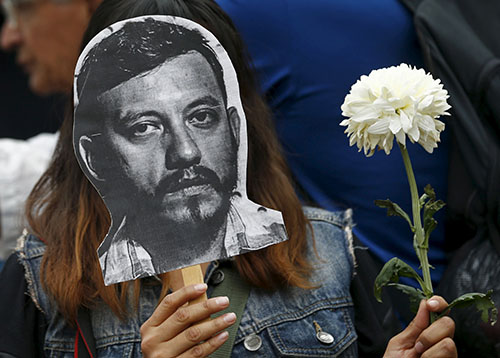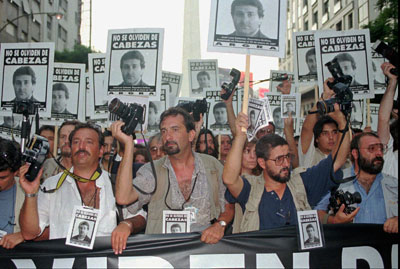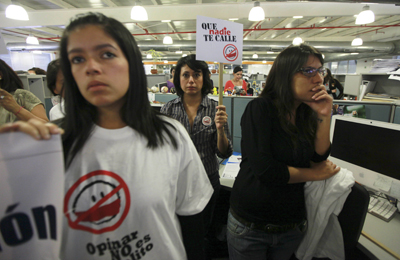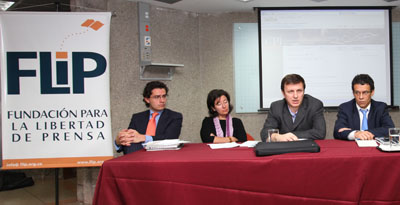Carlos Lauría/Americas Senior Program Coordinator
Carlos Lauría, CPJ's program director and senior program coordinator for the Americas, is a widely published journalist. A native of Buenos Aires, he has written extensively for Noticias, the leading Spanish-language newsmagazine. Follow him on Facebook @ CPJ en Español.

The murder of Mexican photographer Espinosa has touched a nerve
The July 31 murder of Mexican photographer Rubén Espinosa hit the press freedom community really hard. Espinosa, who was found in an apartment with four female victims–all of them shot in the head–had fled the state of Veracruz in June and sought refuge in Mexico City, where he thought he would be safe from threats…

As it backs Assange, Ecuador stifles expression at home
The Quito government’s decision to grant Julian Assange political asylum comes at a time when freedom of expression is under siege in Ecuador. President Rafael Correa’s press freedom record is among the very worst in the Americas, and providing asylum to the WikiLeaks founder won’t change the repressive conditions facing Ecuadoran journalists who want to…

Rousseff quiet as Cuban blogger denied travel to Brazil
The response from Cuban officials did not take anyone by surprise. Prominent Cuban blogger Yoani Sánchez had been, once again, denied permission to leave her country after she was granted a visa by the Brazilian Embassy in January to attend a film festival. “I feel like a hostage kidnapped by someone who doesn’t listen nor…

Cabezas’ convicted killers are free, 15 years after murder
It was a cold winter morning more than 15 years ago. As part of my daily routine as a foreign correspondent, I opened my laptop to read the Argentine papers. I was shocked by a headline: my colleague José Luis Cabezas, a photographer for the newsweekly magazine Noticias, had been murdered. His bullet-ridden body was…

Venezuelan censorship over morgue photos is selective
A controversial ruling by a Venezuelan court banning print media from publishing images of violence was partially reversed on Thursday following an international outcry from media, rights groups, and United Nations and Organization of American States officials.
President Calderón responds to CPJ’s concerns
On June 7, we wrote to Mexican President Felipe Calderón Hinojosa about a series of attacks perpetrated against local journalists by federal law enforcement since the beginning of the year. The office of the Mexican president responded on June 16. In a letter to CPJ Executive Director Joel Simon, Calderón informed us that our letter was submitted to the attorney general’s…
Baja California governor urges support of federalization
Four Mexican journalists have been killed so far this year, at least one in reprisal for his work, and several remain missing after a lethal wave of violence in the border city of Reynosa in late February. Pervasive self-censorship is affecting vast regions of the country as a result of the bloody battle for turf between powerful…

Colombian government tells CPJ it ‘rejects’ illegal spying
Shortly after arriving in Bogotá to launch Attacks on the Press, I realized the Colombian government was well aware of our concerns about illegal espionage against the media. Top government officials, including President Alvaro Uribe Vélez, had confirmed meetings with a delegation from CPJ and the local press freedom group Foundation for Freedom of the…

‘Suddenly,’ Chávez is on the radio (yet again)
Venezuelan President Hugo Chávez Frías has used cadenas—nationwide radio and television addresses that preempt programming on all stations—to challenge the private media’s news coverage and amplify the government’s voice. In his radio and TV call-in program, “Aló, Presidente” (Hello, President), Chávez often lambastes critics in the media and the political opposition.

Tomás Eloy Martínez, passionate press freedom advocate
Argentine writer and journalist Tomás Eloy Martínez, who died on Monday after a long battle with cancer, was ranked among Latin America’s most prominent intellectuals. Best known for his novels about former President Juan Domingo Perón and his wife Eva, Martínez cared deeply about press freedom and was a passionate advocate who helped scores of Argentine…